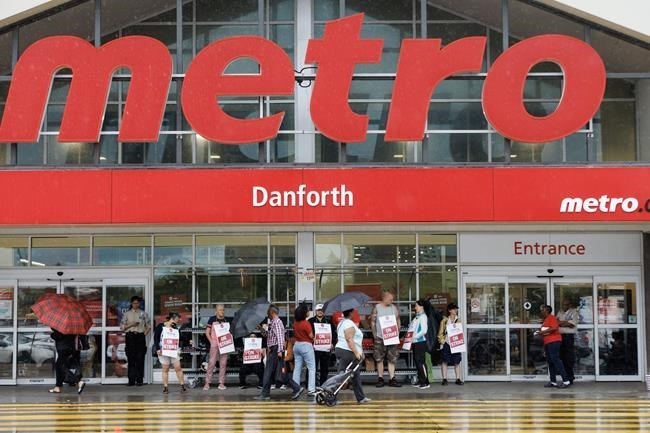TORONTO — Metro grocery store workers on strike in the Greater Toronto Area say they are fighting for their wages to keep up with the cost of living, as the rapid pace of food inflation in recent years has caused struggles in affording the same groceries they sell.
Last week, nearly 3,700 frontline store employees at 27 Metro grocery stores rejected a tentative agreement that had been reached by their union bargaining committee just after a strike deadline. Workers walked off the job Saturday instead of accepting the deal.
Many stationed on the picket line Wednesday said higher pay is essential to any potential agreement reached.
Jason Sylvester, a Metro meat department manager who had been at the grocer’s Gould Street location next to Toronto Metropolitan University’s campus, said he and a dozen other strikers present were “just trying to keep up wages with inflation.”
“We can’t afford to buy the groceries that we put up on shelves ourselves,” he said.
“We just want to keep up with the world.”
Voula Stevens, a bookkeeper in charge of Gould Street Metro’s invoices and payroll, said that after spending her paycheque on other necessities, “you would probably be able to come out with one bag of groceries” from Metro.
“You spend $50, and you have half a bag full of what you need,” said Stevens, highlighting the effect of inflation on Metro’s middle-income grocery prices.
“You might as well go shop somewhere else.”
Despite the annual inflation rate falling to 2.8 per cent in June, as reported last month by Statistics Canada, Canadians are still feeling the pinch at grocery stores. Grocery store food prices were up 9.1 per cent on an annual basis, nearly unchanged from May.
Unifor Local 414, the union representing the striking workers, said wages of full-time and senior part-time Metro store clerks have not kept up with inflation over the past decade.
It said wages for full-time store clerks grew 15.4 per cent between 2013 and 2022, from $17.80 to $20.55 per hour. Meanwhile, the Consumer Price Index has risen in Ontario by 24.3 per cent over that time.
For part-time staff, who represent 72 per cent of the bargaining unit, the average wage is $16.62 per hour, while full-time employees make an average of $22.60 an hour.
More than 2,500 members of the union earn less than $20 an hour, according to Unifor.
Sylvester said the grocery bill for his family of four has risen from about $120 a week to at least $200 over the past two or three years. He said a pay raise of three or four dollars an hour would be a great start to help keep pace.
“When the pandemic was at its height they gave us an extra $2 an hour,” said Sylvester, referring to the “hero pay” received by store staff who worked through the COVID-19 pandemic.
“That really helped out, but then they took that away.”
A report published last month by the Canadian Centre for Policy alternatives found that minimum wages across the country haven't kept up with the cost of rental housing.
As of October 2022, a wage of $25.96 was needed to afford rent for an average one-bedroom unit in Ontario, according to the report, while $29.90 was considered the necessary rental wage for a two-bedroom. Ontario's minimum wage is $15.50.
In a statement, Metro spokeswoman Marie-Claude Bacon said the grocer has offered wage increases "above the current inflation rate."
"As we always do through bargaining, we worked constructively with the union and the employees’ bargaining committee and we reached a mutually satisfactory agreement that they unanimously recommended to employees," she said.
"We reached a fair and equitable agreement."
Hao Thang, a chief clerk also striking from Metro’s Gould Street location, said his medical benefits are also insufficient and have forced him to choose between spending his wages on eye care, rent or food.
But Unifor said Wednesday that the grocery chain is halting striking workers' access to benefits during the labour dispute.
"As you may know, Metro will terminate your access to benefits during the strike action," it said in a note to members.
"In lieu of employer provided benefits, Unifor has established group insurance benefits that you may be eligible to receive if you would normally have access to benefits as a result of your employment at Metro."
Unifor said participation in strike duty entitles members to benefits including hospital care, drug, life, accidental and dismemberment premiums and out-of-province, which is paid for by the Unifor Strike and Defence Fund. To access benefits, workers must complete an enrolment form that is available at local picket lines.
"Benefits are part of the employees’ pay and when they are on strike, the employer stops paying its employees," said Bacon in a statement.
"Our employees currently benefit from wages and working conditions among the highest in the industry which were negotiated by this union."
Sylvester said he learned about the benefits freeze when he was unable to pick up his son’s ear infection medication.
“I’m going for shoulder surgery next week. I’ve been cutting meat for 20 years and that takes its toll on your body,” said Sylvester.
“I'm a little bit stressed about that too, because we’re not covered right now.”
This report by The Canadian Press was first published Aug. 2, 2023.
Companies in this story: (TSX:MRU)
Sammy Hudes and Kiernan Green, The Canadian Press



